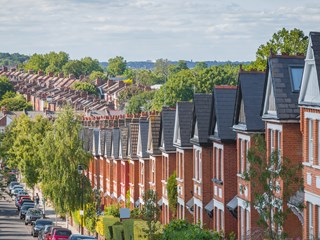
Despite this growth, there has been an annual slowdown in property prices, according to Nationwide BS.
The average house price has grown by 10% over the past year to August, according to Nationwide BS’s house price index. This means annual house price growth has remained in double digits for 10 consecutive months and, over the past two years, the average house has gained nearly £50,000 in value.
Despite constant price growth, the pace has slowed. Previously, the building society’s annual house price growth to the year until July was recorded at 11%.
“There are signs that the housing market is losing some momentum, with surveyors reporting fewer new buyer enquiries in recent months and the number of mortgage approvals for house purchases falling below pre-pandemic levels,” said Robert Gardner, Chief Economist at Nationwide BS.
As a result, Gardner expects house prices to slow further in the coming months as inflation continues to rise and household budgets are constrained.
“Moreover, the Bank of England is widely expected to continue raising interest rates, which will also exert a cooling impact on the market if this feeds through to mortgage rates, which have already increased noticeably in recent months,” he explained.
It is a view shared by Myron Jobson, Senior Personal Finance Analyst at interactive investor, who was also keen to indicate that the market “is nowhere near a crash”.
“The supply-and-demand imbalance isn’t going away, even though the red-hot housing market has cooled in recent months,” he said.
With the energy price cap set to rise next month, Nationwide BS also looked at what type of bills the average homeowner can expect.
“It is important to note that the cap is on the unit price charged to consumers, rather than a maximum bill a household can be charged. So, while a typical household is set to pay £3,545 a year, for some costs will be even higher,” said Gardner.
D-rated energy efficiency properties, which are common across the UK, are set to see a £1,250 annual rise in energy costs from next month, even when factoring in the Government’s £400 rebate.
Properties rated between A and C, meanwhile, will see the lowest annual increase in costs at £1,000 on the year. Alternatively, those rated either F or G will see the highest rise of £2,700.
To find out what energy efficiency rating your property holds, visit the Government’s website.
&
Information is correct as of the date of publication (shown at the top of this article). Any products featured may be withdrawn by their provider or changed at any time. Links to third parties on this page are paid for by the third party. You can find out more about the individual products by visiting their site. Moneyfactscompare.co.uk will receive a small payment if you use their services after you click through to their site. All information is subject to change without notice. Please check all terms before making any decisions. This information is intended solely to provide guidance and is not financial advice. Moneyfacts will not be liable for any loss arising from your use or reliance on this information. If you are in any doubt, Moneyfacts recommends you obtain independent financial advice.